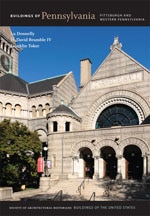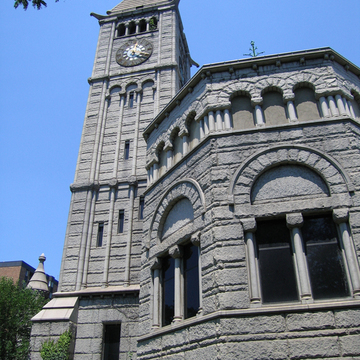This library enjoys the technical distinction of being the first Carnegie public library in the United States, since Carnegie's library in Braddock (AL56) was a proprietary gift to the steelworkers at his nearby plant. Andrew Carnegie made the gift offer in 1886 to Allegheny City, “the city which was my first American home.” The national competition for the library was handily won by the firm of Smithmeyer and Pelz, who had just finished the Library of Congress in Washington, D.C. Taking no chances, the architects adhered closely to the detail and massing of H. H. Richardson's courthouse (AL1), especially in the massive square tower that anchors the corner. The library included spaces for an art gallery, lecture hall, and a concert auditorium to accommodate an audience of 1,100. The library has closed and been replaced by a new building at 1230 Federal Street, but the auditorium serves now as a theater. In 2007, EDGE studio modernized the lobby, respecting the historic character of the building while bringing the box office and concessions area into the twenty-first century. In front of the library stands the central portion of Daniel Chester French's monument to James Anderson (1904, Henry Bacon), which Carnegie commissioned in memory of the man who, before him, made books available to a working public.
You are here
Carnegie Library of Pittsburgh, Allegheny Branch
If SAH Archipedia has been useful to you, please consider supporting it.
SAH Archipedia tells the story of the United States through its buildings, landscapes, and cities. This freely available resource empowers the public with authoritative knowledge that deepens their understanding and appreciation of the built environment. But the Society of Architectural Historians, which created SAH Archipedia with University of Virginia Press, needs your support to maintain the high-caliber research, writing, photography, cartography, editing, design, and programming that make SAH Archipedia a trusted online resource available to all who value the history of place, heritage tourism, and learning.


